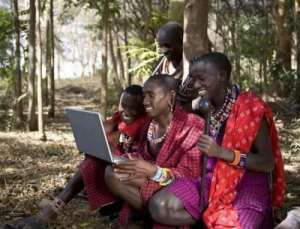
The influence of technology has facilitated the spread of mobile companies throughout Africa, but the development of technology on the continent compared to rich countries is becoming unbridgeable. The digital divide gap between those who have and those who do not have access to the network is increasingly evident in most of the less developed countries.
In this part of the world, in fact, states are unable to guarantee access to new technologies for large sections of the population with low incomes, as in the case of the rich computerized countries.
According to the Global Information Technology report: In the less developed countries, only 4 out of 10 people are connected to the internet. The study analyzes the impact of information and communication technologies (ICT) on economic development, competitiveness, and employment using a sample of 139 states.
It should be emphasized that in the last ten positions of the ranking, there are eight African countries, plus Nicaragua and Haiti. According to the data collected in the report, based on the Networked Readiness Index, formed by the set of factors that allow digitization to fully develop its potential in society and the economy, these ten countries still show very reduced values relative to the environment and to the ICT infrastructure.
This gap constitutes a serious obstacle to the development of the digital economy and to the involvement in the adoption and use of new technologies by three groups of stakeholders, government, and the private sector.
A practical example of how digital innovation in Africa is able to bypass old technologies at a surprising speed, provided by the impact of the internet on the continent, widely analyzed on the Internet for education study in Africa.
The report shows that today, Africa is the second fastest growing mobile phone market in the world and in some countries, including Botswana, Gabon, Namibia, and there are more mobile subscriptions.
This particular situation of the continent, largely without infrastructures that allow access to telecommunications, meant that mobile telephone permeated the territory much more quickly than any other technology. Nevertheless, the study shows that the continent still has the lowest penetration of connectivity compared to any other market and services.
To increase the penetration rate of internet users in the macro-region, new infrastructures and economic involvement by governments would be needed. From the operators' point of view, instead, there has already been a downward trend in tariffs, both for communications and for the prices of individual smartphones, which are increasingly accessible.
Not to mention that in Africa, where the growth in the number of subscribers and then the spread of mobile phones are greater, digital technology could also improve the economic well-being of the entire population. A practical example is e-commerce, which from rural communities in Uganda to small sellers in South Africa, Senegal, and Kenya is helping traders get better prices and sell their products faster.
Already two years ago, in a study on the Information Economy, the United Nations Conference on Trade and Development – UNCTAD, pointed out that this innovative form of trade could stimulate the growth of the middle class in Africa, giving consumers access to a wider range of choice, better quality and convenience, and lower prices.
However, in Africa, there is also a large number of over 3.9 billion people, corresponding to 53% of the world population, which does not yet have access to the network, as noted by the latest ICT Facts and Figures published by the International Telecommunications Union - ITU, the specialized agency of the United Nations in Information Technology.
The report indicates that developing countries now have 2.5 billion connected users against the billion in advanced economies. But if you look at the penetration rate, the situation is quite different. The internet reaches 81% of people in developed countries, 40% in developing countries and only 15% in less developed ones.
There are poorest countries in Africa, where only one person in ten is online but the recent Internet report on barriers and user strategies points indicate that perspectives from Kenya, Nigeria, South Africa, and Rwanda, even in the most developed countries of the continent, there are still numerous barriers that prevent residents from connecting to the network.
The study, carried out by Mozilla and Research ICT Africa Net, estimates that only 25% of the African population has access to the Internet and that the relevant funds allocated by the various governments to expand coverage have not significantly created any impact to improve the situation.
These problems need attention because mobile technology can offer the continent the possibility of partially overcoming traditional obstacles.




 Whoever participated in the plunder of the state must be held accountable – Jane...
Whoever participated in the plunder of the state must be held accountable – Jane...
 A vote for John and Jane is a vote to pull Ghana from the precipice of destructi...
A vote for John and Jane is a vote to pull Ghana from the precipice of destructi...
 I’ll repay your abiding confidence with loyalty, understanding and a devotion to...
I’ll repay your abiding confidence with loyalty, understanding and a devotion to...
 ‘I’ve learnt deeply useful lessons for the future' — Serwaa Amihere breaks silen...
‘I’ve learnt deeply useful lessons for the future' — Serwaa Amihere breaks silen...
 I’m sorry for the embarrassment – Serwaa Amihere apologises for leaked sex video
I’m sorry for the embarrassment – Serwaa Amihere apologises for leaked sex video
 Dumsor: Matthew Opoku Prempeh not in charge of Energy sector – Minority
Dumsor: Matthew Opoku Prempeh not in charge of Energy sector – Minority
 Adu Boahen’s murder: Police arrest house help who was in possession of deceased’...
Adu Boahen’s murder: Police arrest house help who was in possession of deceased’...
 Akufo-Addo nominates Felicia Attipoe as Tema West MCE
Akufo-Addo nominates Felicia Attipoe as Tema West MCE
 Election 2024: I can't have someone I defeated twice as my successor – Akufo-Add...
Election 2024: I can't have someone I defeated twice as my successor – Akufo-Add...
